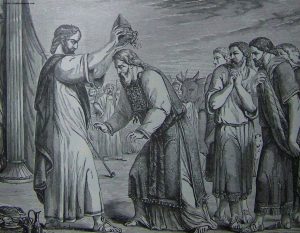Today’s “parasha” {פרשה} (weekly Torah portion) is “Be-Har” {בהר} (‘on the mount’ in Hebrew) – which is the ninth “parasha” in the Book of Leviticus and is found in Leviticus 25:1–26:2.
This week Torah portion discusses primarily the ‘Shemita’ {שמיטה} (the Sabbatical year) and the laws regarding loans and debts. Next week we will talk about the strong connection between the two issues, which stands out when going deeper to the original Hebrew meaning.
The name of our weekly Torah portion derived from the opening verse:
“The LORD spoke to Moses on Mount Sinai, saying.” (Leviticus 25:1)
Since the ‘mount’ it is referring to is Mount Sinai, in some of the old books this ‘parasha’ is called ‘Be-Har Sinai’ {בהר סיני} (‘on Mount Sinai’). One of the most interesting interpretations about the unique name of the weekly Torah portion points out the ‘disappearance’ of the ‘Kohanim’ {כהנים} (‘priests’) in general and Aaron the priest in particular.

Interestingly they are not mentioned at all in the ‘parasha’ – a very rare case in the Book of Leviticus since it t received its name due to its priestly laws. According to this interpretation, the name of the weekly Torah portion ‘Be-Har’ was chosen to imply the presence of Aaron in the ‘Parasha’ by emphasizing that Aaron’s name is derived from the Hebrew word for Mount – ‘Har’{הר} (*in Hebrew one can see that both ‘Har’ {הר} and ‘Aaron’ {אהרן} share the same root).
In fact, many of you probably remember the biblical site of Aaron’s death that was linked with his name as mentioned in the Book of Numbers: “And Aaron the priest went up Mount Hor at the command of the LORD and died there…” (Numbers 33:38)
‘Mount Hor’ appears in the original Hebrew as ‘Hor Ha-Har’ {הר ההר} and actually repeats the Hebrew word for ‘mount’ or ‘mountain’ twice.
Speaking of mountains, one of the upcoming posts will discuss the interesting story of Mount Sinai and the Sabbatical year – a story that created a well-known Hebrew phrase so stay tuned…
